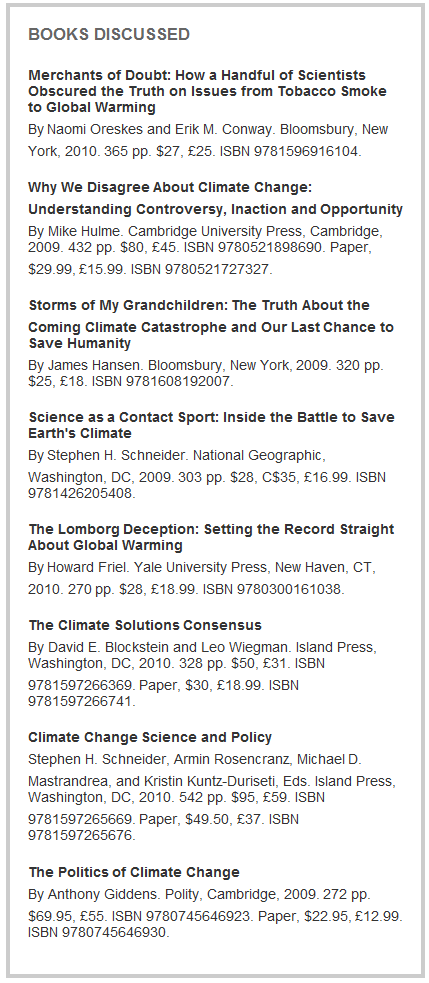|
|
|
|
|
|
|
News & Views item - June 2010 |
![]() Climate Change and the Philosopher. (June 4, 2010)
Climate Change and the Philosopher. (June 4, 2010)
Philip Kitcher is the John Dewey Professor of Philosophy at Columbia University,
and has as his principal interest the philosophy of science, having written on
the ethical and political constraints on scientific research, the evolution of altruism and
morality, and the "possible" conflict between science and religion. His book
Abusing Science: The Case Against Creationism was published in 1982,
Science, Truth, and Democracy (Oxford Studies in the Philosophy of
Science), in 2001 and most recently (2007) Living
with Darwin: Evolution, Design, and the Future of Faith.
and political constraints on scientific research, the evolution of altruism and
morality, and the "possible" conflict between science and religion. His book
Abusing Science: The Case Against Creationism was published in 1982,
Science, Truth, and Democracy (Oxford Studies in the Philosophy of
Science), in 2001 and most recently (2007) Living
with Darwin: Evolution, Design, and the Future of Faith.
Professor Kitcher was given eight books by Science and asked to undertake a group review under the title "the climate change debates".
If the few excepts below help to interest readers to access the whole of Professor Kitcher's review and then perhaps move to the collection of books reviewed they will have served their intent.

He summarises the essence of the "debate": It is useful to differentiate three questions. First is the issue of whether human activities, specifically actions that increase the emission of greenhouse gases, are contributing to a significant average warming of Earth. (As all the expert authors point out very clearly, there is no suggestion that the temperature of every region will rise during the next decades.) Second are questions about the probabilities with which various phenomena (complete melting of ice sheets, for example) will occur and about their consequences for human beings and other species. Third are considerations about what might be done to halt (or even reverse) the warming and to limit the damaging consequences.
One of the key and damning points Professor Kitcher makes in analysing the continued public "climate debates" is the: Media contributions to public confusion... There is a serious question as to whether American science journalists have conspicuously failed to discharge what might have seemed their central function: to enlighten the public about topics of concern, in areas where an expert consensus has been reached.
He then continues: It is an absurd fantasy to believe that citizens who have scant backgrounds in the pertinent field can make responsible decisions about complex technical matters, on the basis of a few five-minute exchanges among more-or-less articulate speakers or a small number of articles outlining alternative points of view. Democratic ideals have their place in the conduct of inquiry, for it is arguable that there should be more communication between scientists and outsiders in the construction of research agendas, in the discussion of standards of acceptable risk, and in the articulation of policies based on scientific consensus. Genuine democracy, however, requires a division of labor, in which particular groups are charged with the responsibility of resolving questions that bear on the interests of individuals and societies. Other groups, those covering such questions in the media, have the duty to convey the results so that citizens can cast their votes as an enlightened expression of freedom, justifiably aimed at the outcomes for which they hope.
And finally: All the books reviewed here were written before climate change deniers exultantly exposed the mistakes made by the IPCC in announcing the imminent demise of the Himalayan glaciers and the "conspiratorial e-mails" from the East Anglia climate center. In the wake of these "important revelations," the merchants of doubt were back in business. In December 2009, Reuters published a discussion by Singer in which he claimed that the IPCC report was based on "distorted raw data" and algorithms that were not shared with other scientists (5). Few readers of Singer's presentation, or those given by other longstanding climate-change deniers, learned that there is significant independent evidence for Himalayan glacier melt, although not as rapid as the erroneous sentence implied. Probably still fewer understood that the competitive-cooperative interactions among scientists often involve unguarded remarks about the work of rival "teams," and that references to "tricks" frequently advert to strategies for simplifying complicated mathematical problems or (as in this case) graphical methods of presenting a conclusion perspicuously, rather than to stratagems for deceiving the public. Captured by a na´ve and oversimplified image of what "objective science" is like, it is easy for citizens to reject claims of scientific authority when they discover that scientific work is carried out by human beings.